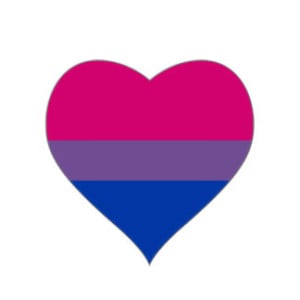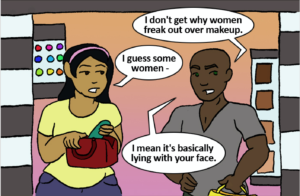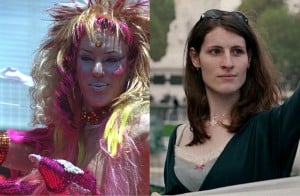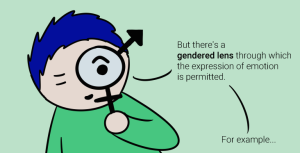Speaker 1: Do you think there’s a line where a body type becomes unhealthy?
Speaker 2: Yeah, like if you’re over 300.
Speaker 1: What size do you think plus size would start at?
Speaker 3: Doesn’t it start at like a 14? I don’t know.
Speaker 4: I mean, if you’re overweight, then it’s obviously not healthy.
Speaker 1: What would you say would be the opposite of plus size?
Speaker 5: Like normal.
Speaker 1: How would you define “normal?”
Speaker 5: I have no idea.
Marie Southard Ospina: On its most basic level, body positivity is the idea that all bodies are good bodies. When you think of what TV, magazines, and movies tell us a good body is, which celebrities come to mind?
Speaker 1: We’re asking people which celebrity they think has a really great body.
Speaker 3: I think Jennifer Lawrence has my ideal body.
Speaker 7: I definitely Jennifer Aniston has a good body. She’s toned. I don’t know. She looks healthy.
Speaker 1: Who would you choose?
Speaker 8: Jessica Alba. She has a healthy body type in my opinion.
Marie: What can we deduce about good bodies based on these women? Good bodies are thin, straight, and most often white. There’s nothing wrong with having a body like this, but the body positivity movement strives to create representation from marginalized bodies. We want to see fat bodies, queer bodies, bodies of color, and everything in between, up front and center in mainstream media. You might have noticed that a common descriptor for these traditionally accepted body types is “healthy,” but can you really tell if someone is healthy by looking at them?
Speaker 4: I mean, if you’re overweight, then it’s obviously not healthy because you’re lugging a lot of excess weight around. It’s proven not to be healthy. People have died from overweight.
Marie: Just because someone is fat or just because someone is thin doesn’t necessarily mean that that person is healthy or unhealthy. Even if someone is clinically unhealthy, that doesn’t make them any less worthy of self-love.
Speaker 8: Just by looking at someone, you can’t tell their genetic makeup. You don’t know their family background, their family history. There’s a lot of things that go into health rather than it just being, “Are you a size zero or a size eight?”
Marie: Even though the body positive movement is for everyone, no matter what type of body you have, many plus size body positive activists are asking the question, “Is it okay to call someone fat? Does the term plus size suggest that fat bodies aren’t normal?”
Speaker 1: Do you think plus size has good connotations, bad connotations, or…?
Speaker 2: I feel like often it has bad connotations. People are always saying bad things about people that are plus size.
Speaker 9: I think it’s usually considered negative.
Speaker 1: What do you think is the opposite of the word plus size?
Speaker 7: I guess negative size.
Speaker 10: I mean, I guess just not plus sized.
Marie: Plus size body positive activists, including yours truly, are reclaiming words like “fat” and “plus size” as descriptors and nothing more, just like someone might be tall or short. It’s not an insult. It’s a characteristic. Bottom line, the body positive movement wants everyone to feel worthy of self-love, whether your body looks like that slender woman on the TV, like your favorite plus size blogger, or anything in between.
Speaker 1: What type of bodies would you want to see more in the media?
Speaker 2: Probably more plus size. I feel like there should be more because I feel like they’re not appreciated enough.
Speaker 7: I’m tall, so I like to see more tall people. It makes me feel better about myself.
Speaker 5: I mean, just all kinds of bodies, really. I don’t think we should limit it to any one particular type.
Speaker 7: It makes it harder to define what a perfect body is if there are so many out there.
Speaker 3: I think every body is beautiful, and I wish more people embraced that and understood that.
Marie: You deserve to feel beautiful, and you deserve to feel worthy. It’s that simple.




















